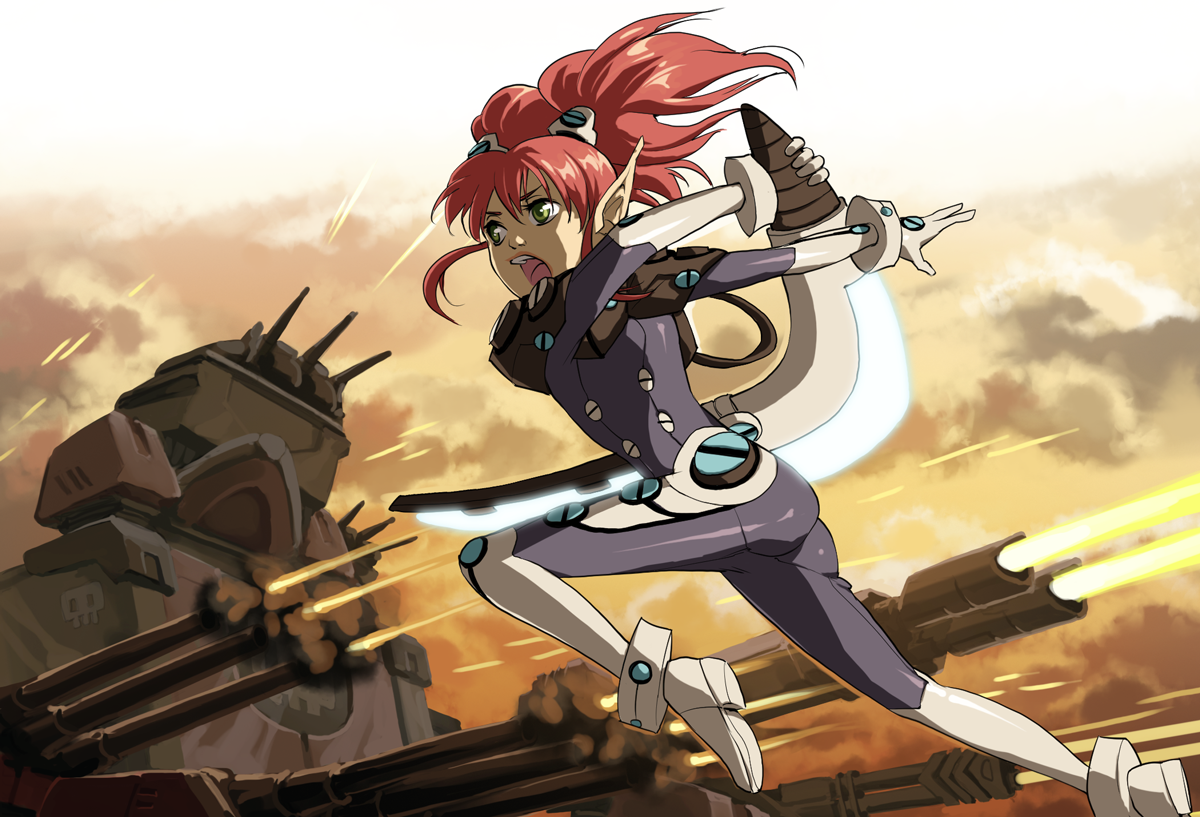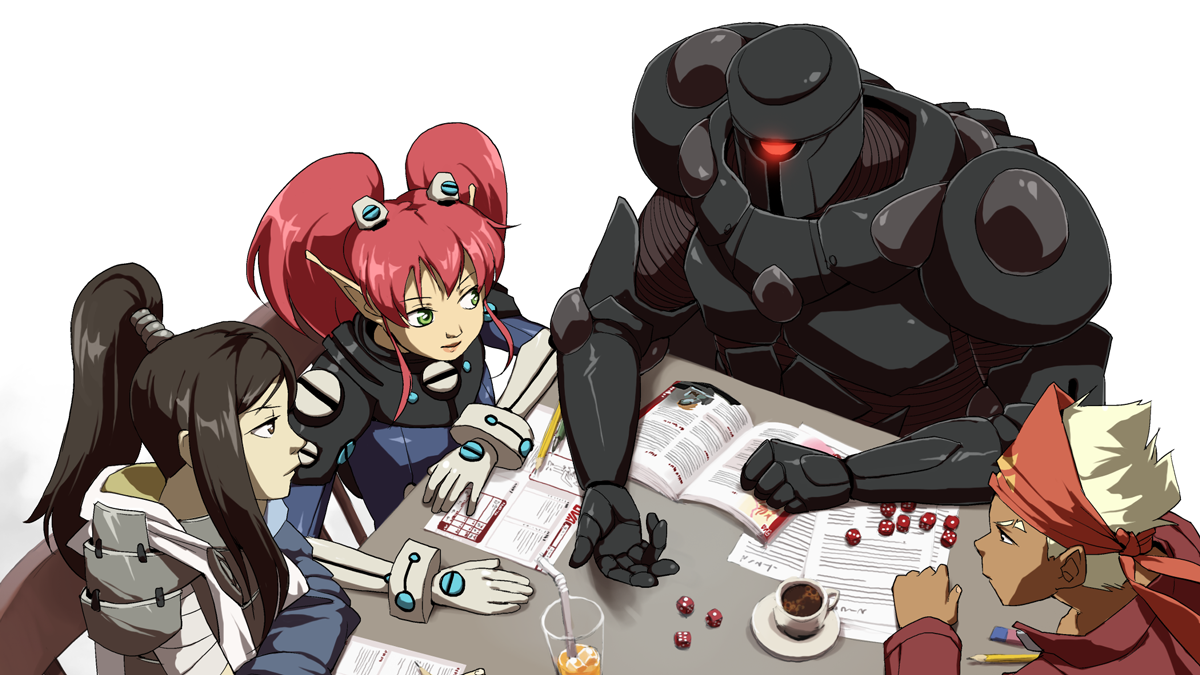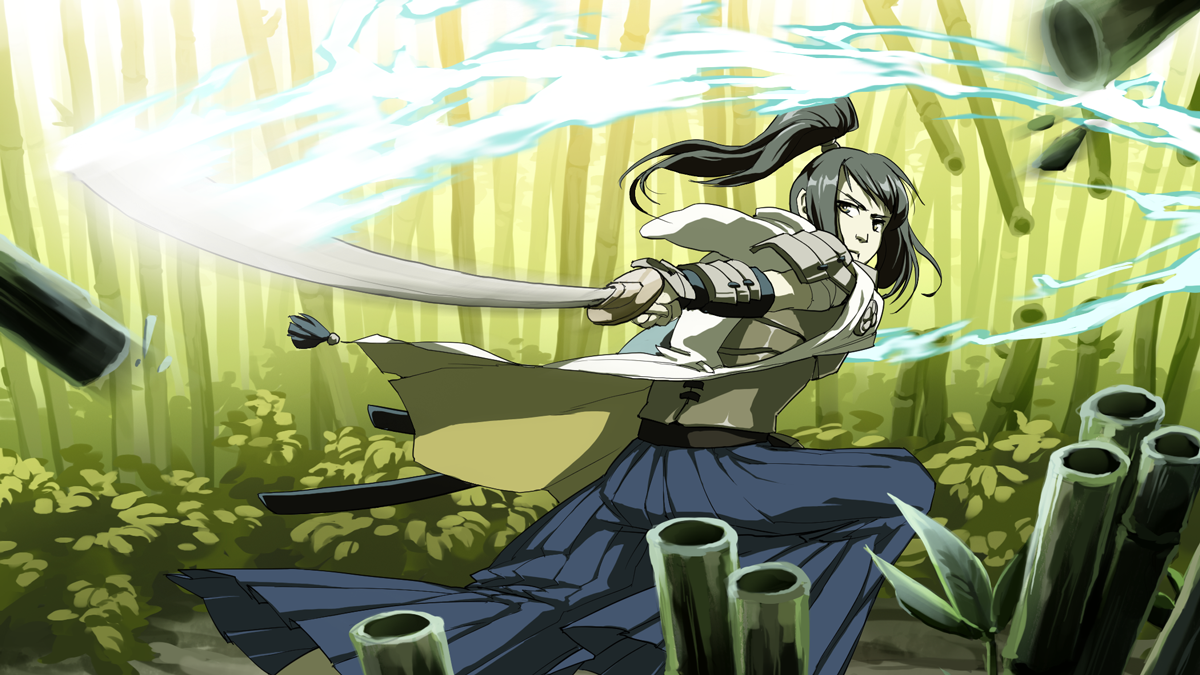Those of you who happen to have a copy of OVA’s first edition might remember its afterword, wherein I described my early adventures in RPG design and an epiphany concerning how to make OVA not only better, but different from any RPG that had come before: by dropping hard-coded stats from the game.
But it wasn’t the first RPG to do that. Not quite anyway. I’d later discover that characters being made up of customizable traits instead of a preset array of attributes had been done by Ross’s RISUS and before that by Tweet’s Over the Edge. They’re not quite the same of course—OVA goes so far as to define a vast collection of its Abilities and Weaknesses (making up the longest chapter in the book), while both of the aforementioned titles are far more freeform affairs.
But even so, it was a big step for quote-unquote anime RPGs, and considering how grounded I was in the RPGs of the 80s and 90s, it was still a big step for me. When I approached the new revised edition of my game I wanted to do my best to keep my eyes open for similar evolutions in its design.
Something that was important to me in the original OVA was not to punish players for being “cool.” My favorite example of this is the protagonist of Cowboy Bebop, Spike Spiegel. Again and again throughout the series, Spike is shown to be a skilled martial artist and marksman. This is a build that simply doesn’t work in many RPGs because it requires putting points into two usually separate skills, hand-to-hand and guns. What little versatility is offered by training in both is quickly overshadowed by the limited resource of build points—a character can only be half as good in two areas as they could be in one.
 But Spike isn’t just sort of good at both, he’s great. And if you couldn’t create Spike with ease in OVA, then that’s as much of a litmus test as anything. With that in mind, I condensed every combat skill into an Ability called, well, Combat Skill. With one attribute, your character was adept at attacking, whatever form that takes. Sure, it flies in the face of most RPG design that routinely compartmentalize such things, but it just made things so much easier. You could still just do one thing, of course, but if you ever wanted to branch out, you weren’t punished for it.
But Spike isn’t just sort of good at both, he’s great. And if you couldn’t create Spike with ease in OVA, then that’s as much of a litmus test as anything. With that in mind, I condensed every combat skill into an Ability called, well, Combat Skill. With one attribute, your character was adept at attacking, whatever form that takes. Sure, it flies in the face of most RPG design that routinely compartmentalize such things, but it just made things so much easier. You could still just do one thing, of course, but if you ever wanted to branch out, you weren’t punished for it.
But the original OVA still didn’t eliminate the issue. While your ability to hit your opponent was sufficiently simplified, there were still several Abilities to cover actually doing damage. Martial Arts increased damage barehanded, Weapon gave you a weapon, and Power Move let you create a suite of special attacks that dealt even more damage but burned Endurance. It’s a system that worked, but you were still faced with paying more points to build Spike. You had to buy Martial Arts and Weapon—and arguably Power Move to boot.
So I made the single most drastic change between the editions of OVA, I condensed all the damage-increasing Abilities into one called Attack, just as I had with Combat Skill years before. While this did solve the Spike Spiegel issue deftly, probably the biggest boon from this was that it rolled the idea behind Power Move into an Ability that allowed every character to create a suite of attack moves. Whereas before it was limited to flashy energy blasts and the like, now every strike could be its own separate technique. Samurais could swap between offensive styles, ninjas could throw in a sweep kick in their repertoire, and, yes, Spike could mix up gunplay and really swanky fisticuffs. It’s a system that just works for recreating the cinematic style of combat. Moreover, because all Attack represented was your capacity to dish out damage, characters could literally describe these attacks as anything they want at any time. Want to smash a chair over an opponent’s head or stomp a loose plank into their groin? Use your Attack level without worrying about calculating the actual damage of these impromptu weapons. Characters do this all the time in action anime, but it’s typically very hard to recreate in an RPG. No longer!
 While this was easily the most gratifying change to OVA, there’s a vast variety of additions and improvements that I’m also fond of. The original game’s “knockback” was split into three separate combat complications, giving more tactical options to the otherwise streamlined rules. Looking at these, I realized that I could take the same concept and apply them outside of combat, and Succeeding with Complications was born. While I won’t be foolhardy enough to claim this is an entirely new idea (Fate, if nothing else, pushes the “fail forward” concept hard), I’m really please with how neatly it fits into OVA and brings combat and out-of-combat closer together thematically.
While this was easily the most gratifying change to OVA, there’s a vast variety of additions and improvements that I’m also fond of. The original game’s “knockback” was split into three separate combat complications, giving more tactical options to the otherwise streamlined rules. Looking at these, I realized that I could take the same concept and apply them outside of combat, and Succeeding with Complications was born. While I won’t be foolhardy enough to claim this is an entirely new idea (Fate, if nothing else, pushes the “fail forward” concept hard), I’m really please with how neatly it fits into OVA and brings combat and out-of-combat closer together thematically.
Scale was another useful addition, making it really simple to represent vast differences in ability. Need to have a mecha and a battleship go toe-to-toe? You can do that. How about a plucky Pokémon trainer and a tank? Sure, why not. The bout between mere martial artist and a Super-Saiyan martial artist? Faster than you can say, “ His power level is over NINE-THOUSAAAAND!” It’s all represented by a +5 bonus, and it just makes what can be really difficult in other RPGs quick and fun.
Besides that, I focused on consistency, consistency, consistency. Whenever a rule didn’t have a compelling reason to behave differently than other rules, I changed it so that it no longer did. Not only does this make concepts easier to remember, it creates a reliable foundation for hacking the system to do new things. (This happens a lot over at the Wise Turtle Forums.)
And that’s it for three-part my retrospective of OVA! How about you, readers? Do you have a particular favorite addition to the revised game? Or perhaps you remember a houserule for another RPG that you thought was really novel? Let me know in the comments!


Hey, Clay.
I’ve just bought OVA 2e. What a fantastic product! I was looking for something easy and light that I could play with my nephews and nieces, to get them into role-playing games. I was going to dig out my Teenagers From Outer Space 1e, but then I found this product. I was simply blown away with the rules and production quality. You make excellent RPG’s, my good sir!
I’m so glad you’re enjoying the game! Part of my goal with OVA was to make it have a lot of interesting choices but still be simple enough to make sense to non-gamers (old and young alike.) Of course Teenagers from Outer Space is a great game too and definitely ahead of its time. If you have any questions about OVA, feel free to email me or drop by the Wise Turtle forums over at wiseturtle.com!